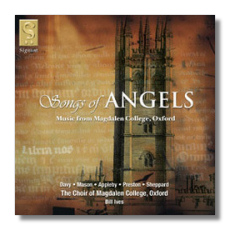
The Internet's Premier Classical Music Source
Related Links
- Latest Reviews
- More Reviews
-
By Composer
-
Collections
DVD & Blu-ray
Books
Concert Reviews
Articles/Interviews
Software
Audio
Search Amazon
Recommended Links
Site News
 CD Review
CD Review
Songs of Angels

Music from Magdalen College (1480-1560)
- John Sheppard:
- Dum transisset sabbatum
- Pater noster
- Libera nos
- Richard Davy: Stabat mater
- John Mason: Quales sumus
- Jacquet of Mantua: Aspice Domine
- Thomas Preston: Resurrexi III; Offertory Confessio et pulchritudo
- Thomas Appleby: Magnificat
- Sarum plainchant: Vespers Hymn Collaudemus Magdalene lachrymas; Magnificat antiphon Inclita sancte Marie Magdalene
Duncan Ferguson, organ
Choir of Magdalen College Oxford/Bill Ives
Signum SIGCD038 74:16
The Choir of Magdalen College Oxford is releasing its first disc with Signum, of music composed for the College by Magdalen's distinguished 15th and 16th century 'Informatores Choristarum' (Instructors of the Choristers). The complete texts and translations are printed on Signum's exemplary website, together with very detailed scholarly notes by David Skinner, whose historical essay explains how Magdalen College has been a centre of musical activity in Oxford since the late 1400s. The music collected here was all sung at Magdalen or composed by Magdalen composers between 1480 & 1560; few other musical institutions could envisage such a project with any comparable sense of continuity.
Pride of place goes to John Sheppard who, so we learn, ran into trouble in the College for administering over-harsh discipline to one of his charges, 'having wretchedly chained a certain poor boy and forcibly dragged him from Malmesbury as far as Oxford'. Signum cites his music here as justifying Sheppard's place as one of the masters of Early English Music. Is that still called for? Sheppard, who was brought to notice by David Wulstan and the Clerkes of Oxenford, has been a clear favourite of mine since the 1960s, when Grayston Burgess (singing teacher of my son, the boy treble soloist Simon Woolf) was recording the Eton Choir Book for Argo. On CD, I treasure the John Sheppard CDs of The Sixteen (Hyperion CDD22021/22) and The Tallis Scholars (Gimell Media Vita CDGIM016), Sheppard's 'extraordinary and highly individual style of composition' performed at high pitch with its 'stratospheric writing for trebles – weaving their florid lines over the false-relation-flecked counterpoint below' (Gramophone). Owning a collection which goes back right through the LP era to the 78s, it is my habit to mention older recordings, many of them still in the catalogues, especially those of the 'independent' recording companies, who do not delete at the first signal of unprofitability from their accountants!
This Signum collection of (mainly) lesser known composers is a project of Bill Ives, who directs the men and boys, and it culminates with a magnificent seven-part Libera nos, according to David Skinner among Sheppard's finest achievements. Equally imposing is the longest work, the fifteen minute Stabat Mater of Richard Davy, with textures varied between small groups and full choir, with good boy soloists, everyone named. The sequence is broken with the welcome inclusion of two organ solos by Thomas Preston. The text lacks highlighting of composers' names, so it takes quite a search to learn about Thomas Preston, frustratingly, merely that he 'stepped in' for a year 1542-43 whilst Sheppard was absent – c.p. Robert King's notes for Hyperion's marvellous Purcell boxed sets, my ideal listening aids. Skinner's notes are extensive, interesting in anecdote and musicological detective work, but they lack what the 'ordinary' record buyer needs, guidance on the musical individualities of these composers and what to listen out for; nor is the controversial question of performing pitch discussed. Does the title allotted, 'Songs of Angels', help? I think not; there is another identically titled 'Songs of Angels' CD reviewed in Gramophone this month (de Coincy, L'Oiseau-Lyre) and these marketing ploys tend to cancel each other out, rather as sexy photos of aspiring star musicians have diminishing returns with discriminating purchasers.
The recording, by David Skinner at Magdalen College in March & July 2002, is well balanced and generally satisfactory. The whole project is thoroughly worthwhile and I have enjoyed it, but this CD is one more for specialists than for general music lovers.
Copyright © 2002, Peter Grahame Woolf




















